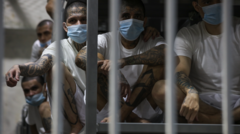The proposal aims to address the plight of both Venezuelan deportees accused of serious crimes and the government's alleged political prisoners.
**El Salvador Proposes Deal for Venezuelan Political Prisoners in Exchange for Deportees**

**El Salvador Proposes Deal for Venezuelan Political Prisoners in Exchange for Deportees**
El Salvador's President Nayib Bukele suggests a prisoner swap with Venezuela, offering to return US deportees for the release of political prisoners held by the Maduro government.
In a bold humanitarian proposal, El Salvador's President Nayib Bukele has offered to repatriate 252 Venezuelans who were deported by the United States and are currently imprisoned in his country. In exchange, he is calling for the release of an equal number of Venezuelan political prisoners held by President Nicolás Maduro's government.
Bukele took to social media to deliver his proposal directly to Maduro, emphasizing that while the Venezuelan deportees have been accused of serious crimes such as rape and murder, those imprisoned by the Venezuelan government are often political detainees facing incarceration simply for opposing the Maduro regime. Human rights groups, meanwhile, have dismissed the government's assertion that no political prisoners exist.
He stated in his post on X, formerly Twitter, "I want to propose you [Maduro] a humanitarian agreement calling for the repatriation of 100% of the 252 Venezuelans who were deported, in exchange for the release... of the identical number from among the thousands of political prisoners that you hold."
In addition to the Venezuelans, Bukele noted the potential involvement of nearly 50 prisoners from other nations, including US citizens. However, as of now, the Venezuelan government has not publicly responded to this offer.
Recent weeks have seen the arrival of over 200 Venezuelans sent from the US back to El Salvador, as part of the Trump administration's immigration crackdown which includes allegations that many are affiliated with the criminal gang Tren de Aragua. El Salvador, which receives financial assistance from Washington to detain these deportees in its notorious high-security Terrorism Confinement Center, is now at a crossroads concerning its immigration policies in light of ongoing legal challenges against mass deportation practices.
The contentious backdrop includes the US Supreme Court's recent order to pause deportations of another group of Venezuelan nationals. This ongoing saga does not only present a diplomatic challenge for both nations but also highlights the deepening complexities surrounding immigration law and human rights across the region.
Bukele took to social media to deliver his proposal directly to Maduro, emphasizing that while the Venezuelan deportees have been accused of serious crimes such as rape and murder, those imprisoned by the Venezuelan government are often political detainees facing incarceration simply for opposing the Maduro regime. Human rights groups, meanwhile, have dismissed the government's assertion that no political prisoners exist.
He stated in his post on X, formerly Twitter, "I want to propose you [Maduro] a humanitarian agreement calling for the repatriation of 100% of the 252 Venezuelans who were deported, in exchange for the release... of the identical number from among the thousands of political prisoners that you hold."
In addition to the Venezuelans, Bukele noted the potential involvement of nearly 50 prisoners from other nations, including US citizens. However, as of now, the Venezuelan government has not publicly responded to this offer.
Recent weeks have seen the arrival of over 200 Venezuelans sent from the US back to El Salvador, as part of the Trump administration's immigration crackdown which includes allegations that many are affiliated with the criminal gang Tren de Aragua. El Salvador, which receives financial assistance from Washington to detain these deportees in its notorious high-security Terrorism Confinement Center, is now at a crossroads concerning its immigration policies in light of ongoing legal challenges against mass deportation practices.
The contentious backdrop includes the US Supreme Court's recent order to pause deportations of another group of Venezuelan nationals. This ongoing saga does not only present a diplomatic challenge for both nations but also highlights the deepening complexities surrounding immigration law and human rights across the region.



















